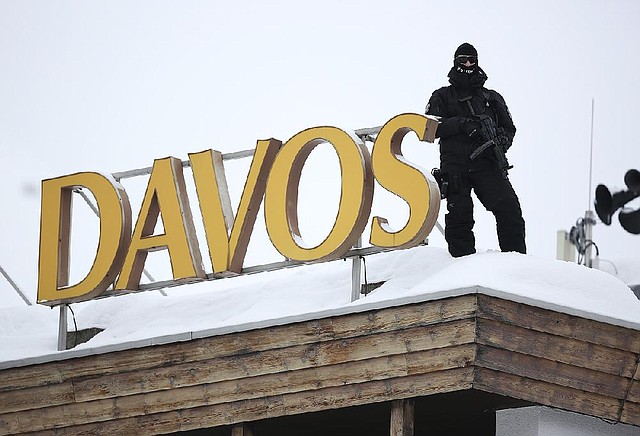Snipers on roof as Davos starts
Ahead of meeting, Swiss gird for terrorists, refugees
An armed police officer stands on the snow-covered rooftop of the Hotel Davos and looks out over the Congress Center, the venue for the World Economic Forum (WEF) in Davos, Switzerland, on Tuesday, Jan. 22, 2013. World leaders, Influential executives, bankers and policy makers arrive in the Swiss Alps for the 43rd annual meeting of the World Economic Forum in Davos, the five day event runs from Jan. 23-27. Photographer: Jason Alden/Bloomberg
Wednesday, January 23, 2013
DAVOS, Switzerland — The snipers on the rooftops of Davos and the miles of barbed wire snaking through the Alpine resort town are signs that Swiss military officials have more than the security of the world’s leaders and business elite in mind.
About 3,300 troops will protect government heads and billionaires this year, including Britain’s David Cameron and Italy’s Mario Monti, and secure the airspace in a 28-mileradius around Davos.
They are also preparing for a worst-case scenario: European chaos sparked by a collapse of the euro.
At their annual exercise in September, the Swiss army drilled for a conflict between two fictitious neighboring states in crisis. The challenge was figuring out how to turn Switzerland into a fortress that could keep out the flood of refugees a conflict would send its way.
“Rising nationalism in Europe is a trend that needs to be monitored,” Major-General Jean-Marc Halter, 54, Switzerland’s second-highest ranking officer who took charge of the war game and is overseeing security at Davos, said in an interview at his headquarters in the Swiss capital, Bern. “It’s the army’s job to protect the country against all possible security threats.”
While Switzerland hasn’t seen conflict since the Sonderbund civil war of 1847, Davos has provided a chance to demonstrate military readiness ever since former Palestinian leader Yasser Arafat attended the forum in 1985.
The five-day event in Davos, which starts today, is the single biggest operation executed by the Swiss army this year.
“In Davos we gain insight into the effectiveness of our training, procedures and chain of command,” said Halter, adding that instability on Europe’s periphery is “a scenario that needs to be thought through.”
Switzerland is right not to be complacent, said James Galbraith, a professor of government and business rela-tions at the University of Texas, who warns of a potential “explosion of violence” on the continent.
“Europe is still heading toward a social and human crisis,” he said in a Jan. 11 interview. “In Greece, there’s already a breakdown of public order. You have the rise of an essentially fascist organization that’s harassing immigrants.”
If Spain, which is plagued by regional divisions, leaves the euro, the country could break apart, Galbraith said.
“These things have the potential to escalate very rapidly, which is what we saw in Yugoslavia,” where a series of wars killed more than 120,000 people after the state disintegrated in 1991, Galbraith said. “When I speak of Yugoslavia, it’s to remind people that advanced societies have the potential for advanced levels of violence.”
On Jan. 14, a gunman fired at Greek Prime Minister Antonis Samaras’ office at his party’s Athens headquarters after a spate of fire-bombings around the capital. Rioters in February set fire to a number of buildings housing a Starbucks cafe, a bank and a movie theater in the Greek capital. The Italian government said last May it would step up the use of armed forces to safeguard more than 14,000 “sensitive” sites across the country in the face of increasing violence.
More than 10 miles of barbed wire help deter most attacks on Davos and thwart the attentions of anti-globalization activists, who in 2000 broke a window at a McDonald’s, vandalized several cars and burned a U.S. flag. Still, “there is a certain potential for violence that can’t be ignored,” Halter said.
The risk that civil unrest in Europe would trigger a wave of refugees into Switzerland is nevertheless slim, said AnandMenon, an associate fellow at Chatham House in London and professor of west European politics at the University of Birmingham. Wide-scale migration requires “something cataclysmic,” said Menon, who sees Islamic terrorism as a bigger threat, especially since France’s intervention in Mali.
“Greece, to a significant extent, is no longer self-governing and that will cause problems there,” said Menon. “But I don’t think it represents a security threat to other countries, certainly not as far afield as Switzerland.”
The role of the army at Davos is questioned by some lawmakers as providing security for the forum runs up an $8.6 million bill for Swiss taxpayers.
“The army should be used when Switzerland is threatened by a foreign power,” said Geri Mueller, a lawmaker for the Swiss Greens. “It has no business being there.”
Switzerland’s neutrality laws, which stem from the Treaty of Paris signed after Napoleon’s defeat at Waterloo in 1815, ban the military from fighting abroad other than in peacekeeping missions. Swiss have served as mercenaries in European armies since the Middle Ages, and they still provide the papal guard in Vatican City.
Business, Pages 23 on 01/23/2013
